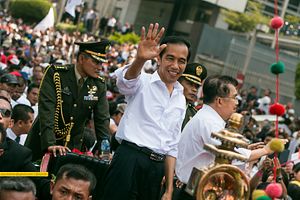Upon coming to power in 2014, Indonesian President Joko “Jokowi” Widodo proclaimed his country’s ambition to become a “global maritime fulcrum.” The doctrine envisions Indonesia as a maritime power that serves as a linkage point between the Pacific and Indian Oceans. That involves both an economic and security component.
The economic front is chugging along. Data released by the Indonesia Investment Coordinating Board (BPKM) recorded a significant 19 percent increase in foreign direct investment from 2014 to 2015. However, the recent activities of Abu Sayyaf reveal the limits of the security leg of the global maritime fulcrum doctrine.
In March, Abu Sayyaf abducted 10 Indonesian crewmen from ships in the waters off the southern Philippines. The motivation, while unclear, appears to have been mostly economic; Abu Sayyaf demanded ransom for the men’s release. The hostages were released on May 1, apparently unharmed. Others have not been so lucky. Abu Sayyaf, also know as “Sword Holder” (Pemegang Pedang), recently beheaded a Canadian hostage and threatened to decapitate four Malaysian hostages.
Abu Sayyaf’s seizure of two Indonesian boats is an entry point to look at the implementation of the global maritime fulcrum more generally. The doctrine is based on five main pillars, one of them being a commitment to maritime security. That includes working to stop “the sources of conflict at sea, such as fish thefts, violation of sovereignty, territorial disputes, piracy and pollution,” as the Jakarta Post has put it.
The recent abduction signals the need for a firmer implementation of Indonesia’s national vision. The case of Abu Sayyaf reveals the currently feeble efforts to secure maritime security and safety. Despite Indonesia’s avowed commitment to maritime security, the non-traditional security threat pose by Abu Sayyaf — and other groups engaged in maritime piracy and other bad behavior — persists, and may be about to get worse. The threat from militant groups such as Abu Sayyaf could culminate in increasing separatist movements under the radical flag of pan-Islamism in Southeast Asia.
However, the transnational nature of the threat has so far prevented Indonesia and the Philippines from finding a solution. Constrained by the ASEAN’s principle of non-interference, Indonesia was not able to intervene militarily against Abu Sayyaf. The Philippines is given the full responsibility of addressing the threat posed by the group, despite signs that it is ill-equipped for the task. A recent clash between the Philippines military and Abu Sayyf left 18 soldiers dead and another 50 wounded.
More broadly, the incident also revealed the lack of practical coordination mechanisms on maritime security and safety between ASEAN member countries. The existing maritime dialogues — the ASEAN Maritime Forum and ASEAN Regional Forum, as well as dialogues with external parties, including the ASEAN-EU Experts Meeting on Maritime Security, ASEAN-U.S. Meeting on Anti-Piracy and Counter-Terrorism, and ASEAN-Japan Maritime Port and Transport Security — are insufficient to build technical and operational mechanisms for managing maritime security and safety. To date, the issue of maritime security and safety remains under-addressed in ASEAN, especially with regards to confidence building measures (CBM) and operational as well as technical matters.
Indonesia, as the promoter of the “global maritime fulcrum” agenda, must define and affirm on how it will grapple with maritime security and safety issues through national policies. Meanwhile, achieving Indonesia’s vision will also need policy and operational support within ASEAN.
The complexity of maritime security and safety issues in Indonesia and Southeast Asia at large demands new efforts, encompassing both policy institutionalization and operational cooperation. With its global maritime fulcrum doctrine, Indonesia could be the key to drive forward these efforts to achieve maritime security and safety for all of ASEAN.
Dedi Dinarto is a research assistant at ASEAN Studies Center, Faculty of Social and Political Sciences, Universitas Gadjah Mada.

































